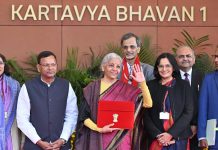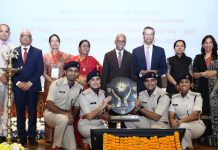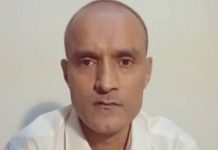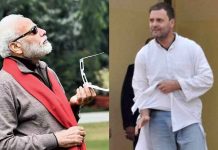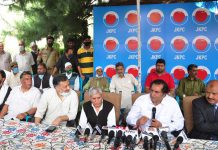The opposition parties in Valley have dubbed the resolution passed in the new state government’s first cabinet meeting for restoration of statehood for the UT as “utter surrender,” accusing the NC of reneging on its promise to strive for reinstatement of J&K’s special constitutional position. A report by Riyaz Wani
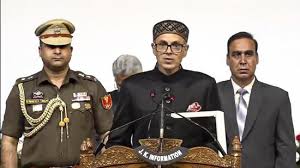
Soon after the newly elected J&K government was sworn in on October 18, the cabinet led by Chief Minister Omar Abdullah in its first meeting passed a resolution urging the central government to restore statehood for the union territory.
The following day, Lieutenant Governor Manoj Sinha cleared the resolution that called for the restoration of Jammu and Kashmir’s statehood “in its original form.” The Chief Minister travelled to New Delhi to handover the draft of the resolution to the Prime Minister and urged him to restore statehood as it existed before August 4, 2019.
However, the opposition parties in the Valley have termed the statehood resolution as “utter surrender”, saying it was a climbdown from Omar’s promise to pass a resolution seeking reinstatement of J&K’s special constitutional position in the first transaction of the new government’s business.
The PDP leader, Iltija Mufti, said that scaling back the demand to just statehood was a “huge setback” for the region. The PDP MLA, Waheed Parra, termed the passing of the resolution on restoration of statehood nothing less than ratification of the August 5, 2019, decision- when J&K special status was scrapped.
Awami Ittehad Party leader and Member of Parliament Engineer Rashid questioned why Omar had asked for statehood when the BJP had already promised its restoration, suggesting that the omission of Article 370 showed the NC was playing into the BJP’s hands.
The People’s Conference chief, Sajad Lone, also referred to the NC manifesto for 2024 Assembly elections, which said that the party would strive for the full implementation of the Autonomy Resolution passed by the Jammu and Kashmir Assembly in 2000 and strive to restore Article 370-35A, and statehood as prior to August 5, 2019.
But the NC has chosen to lie low, apparently not to antagonize the BJP so early on in its term and also in a bid to reach out to the central government. On the statehood, both the parties are on the same page, so are the other regional and national parties including the Congress, Omar’s alliance partner.
However, addressing his party workers in Jammu, a day after being sworn in, Omar reassured them that his government will make every effort to get back what was snatched from J&K.
“We are a Union Territory, but don’t be disheartened. We will regain what has been snatched from us,” Omar said.
In fact, Omar modified his position on Article 370 after his party gained a majority of seats in the Assembly election. He explained that the expectation of getting Article 370 reinstated under the same Central government that scrapped the former state’s special status would be ‘foolishness’. Subsequently, his father and NC President Farooq Abdullah also played down the immediate need to restore Article 370, emphasizing instead that “addressing people’s everyday problems was the top priority.”
New govt’s dilemma
The new government’s silence on Article 370 is understandable. With predominant powers vested in the Lieutenant Governor, it is placed precariously. Omar’s conciliatory tone towards the BJP reflected the NC-Congress alliance’s formidable challenges in the union territory. He wouldn’t be just dealing with the BJP government at the centre and its powerful Lieutenant Governor in J&K but he would also be up against the BJP as a regional opposition party with the second largest number of seats. The saffron party increased its tally in the Jammu division from the 25 seats in 2014 to 29 now, making it the majority party from the Hindu-dominated region.
The situation now is that both the regions have chosen ideologically divergent parties to represent them. While the NC-Congress alliance has won a majority of seats, the BJP, on its own, and even with the support of its purported allies in the Valley couldn’t secure the majority.
This makes the NC-Congress coalition amenable to accusations of leaving out Jammu region from any credible representation in the new elected government. Already such voices have reared their head in Jammu. Social media in Jammu is abuzz with the people expressing resentment at being left out of the government, even after consolidating in favour of the BJP.
Going forward, the new government will need to perform a tough balancing act to survive. With the BJP controlling the Union government and the LG wielding considerable authority in the Union Territory, the NC-Congress coalition will have a tough time asserting its power, if any. The coalition has over 50 seats between them which makes for a secure majority. The BJP, which was hoping to form a government, by roping in the smaller parties and the independents from Kashmir Valley doesn’t have many options. And for now, the party has settled for a role in the opposition but it would be there to make the most of every opportunity to highlight the failure of the NC-Congress coalition.
A waiting game
Will the Centre restore statehood is an open question. It is, however, believed that New Delhi may take its own sweet time, during which it will closely monitor the behaviour of the Omar-led coalition. It is believed that the centre would expect the government to remain “well-behaved” in order for it to take steps in the direction of returning the statehood. New Delhi, analysts in Kashmir reckon, wouldn’t take kindly to the adoption of an aggressive stance on Article 370, a reason that may explain the downplaying of the NC rhetoric on Article 370, contrary to what the party has set out in its manifesto.
“It is unlikely that statehood will be restored anytime soon.” said Naseer Ahmad, author of Kashmir Pending. “There is little indication that the centre is inclined to let go of the control just yet.”
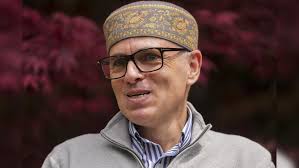
On October 24, the Chief Minister Omar Abdullah presented the cabinet resolution to Prime Minister Narendra Modi advocating the reinstatement of J&K’s statehood. The resolution underlines the J&K government’s commitment to safeguarding the identity and constitutional rights of the region’s residents. He also met Union Home Minister Amit Shah. Although Omar has reportedly been assured about the restoration of the statehood, no action on the assurance is expected in the near future.
“There is nothing new in the HM or the PM reiterating that statehood will be restored. They said this in the parliament,” the People’s Conference chief Sajad Lone wrote this on X, formerly Twitter. “What they never gave was a timeline.”
There is another catch: Even if the statehood is granted somewhere down the line, it is expected to be more or less a truncated one just like that of Delhi. Centre, it is believed will be loath to let go of control on the security agencies and the allied security related matters.
Meanwhile, responding to growing public pressure, the NC has decided to bring a resolution on Article 370 in the upcoming session of the Legislative Assembly and also restore the practice of ‘Darbar Move’, NC MLA and party spokesperson, Tanvir Sadiq said.
Sadiq, NC MLA from Srinagar’s Zadibal constituency and the party spokesman, said that the government will bring a resolution on Article 370 in the upcoming Assembly session and the government will also restore the practice of six-monthly shuttling of top government offices between the twin capitals of Jammu and Srinagar.
“The NC government is committed to fulfilling its 12 guarantees and 26 promises outlined in the election manifesto,” Sadiq said. “Omar Abdullah means business this time and people will witness a sea of change.”

